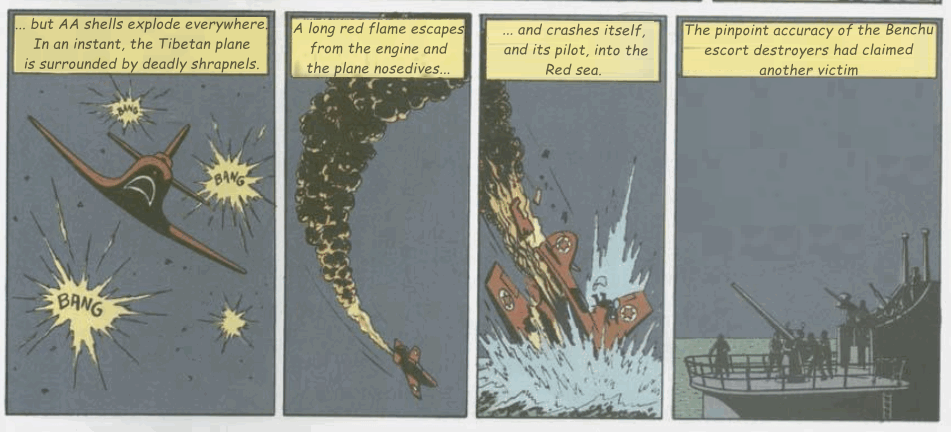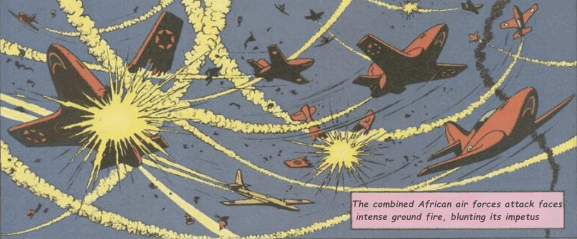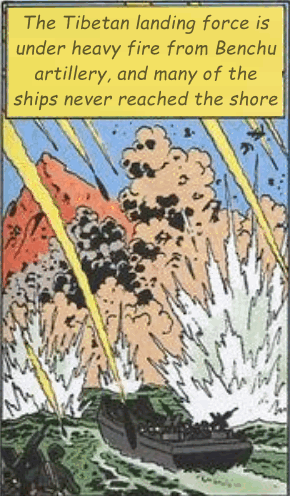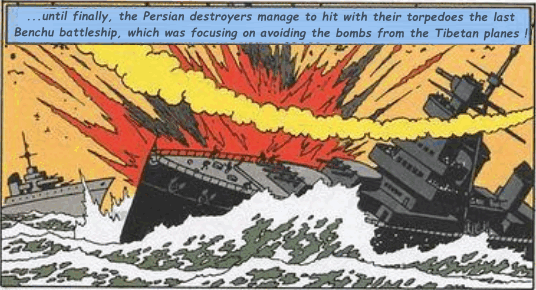 Day 25 to day 27 - Naval action
Day 25 to day 27 - Naval action
After the defeat in the Battle of Egypt, the Tibetan forces were licking their wounds and waiting for reinforcements, including naval reinforcements.
By 13H30, the Tibetan fleet entered the Red Sea... and much to everyone surprise, noticed a SECOND Benchu fleet.

The Benchu fleet was still larger than the Tibetan fleet, but the rest of the Tibetan fleet was about to arrive, and critically Tibet had naval bombers ready. In addition, the CV could be used as decoy for the enemy gunners, and the Tibetans had more destroyers !
The order to attack was given at 15:57, and started with a Tibetan salvo. The weakened Benchu fleet was then immediately attacked by torpedo bombers !

Less than a couple hour after the start of the battle, the Benchu Second Fleet was sunk, with neglectable losses for Tibet !

That's all that happened on day 25...
... but on day 26, the Daila Lama woke-up with a nasty surprise :
A large South-Western African [we all know in reality we should say "Rhodesian"] army had penetrated deep in Europe :


This was serious threat indeed, and emergency communication channel between the Padishah and the Daila Lama immediately opened :

Meanwhile, the Tibetan High Sea fleet moved South along the Somalian coast, devastating the enemy units that were moving North through the narrow strip of land that the Tibetans had conquered and lost only 2 days prior :

The frustrated Benchu tried to counter the attack with strategic bombers, only adding losses for no discernable effect. After losing half their bombers, they broke out.
Meanwhile, and without consulting with its peer from Lhasa, the Padishah Nightmare King decide to strike with the first time with a new kind of weapon : ballistic missiles. Shooting from dedicated areas South of Jauf (where the rockets had been produced), the Padishah aimed at the Benchu airports, in order to cripple their capacity to operate over the Arabic Peninsula and hopefully destroy Benchu aircrafts...

... and in this regard they stroke gold, or maybe we should say aluminium :

Just like that, the Benchu had lost 12 ground attack bomber - absotely all that was left of their tactical bomber force, in addition to having wasted in those few days almost all their strategic bomber force. As an air power, Benchuanaland had been neutralized, though the Rhodesians air force was still considered very strong in the Theater.
The day had been great for the Celestial Union, and morale was restored. But the day was not over - in front of Somalia, the Tibetans fleet, or rather aviators embarked on the Admiral Andnjord, spotted a third Benthu fleet also going North. Meanwhile, Persia sent an alarming piece of news : the First Benchu fleet was not crossing back into the Red Sea [remember that the Suez Canal is large enough that full battle fleet can cross unimpeded !
Once again, the never-ending channel of discussion between Persia and Tibet activated


We are sadly missing images of what was happening in the North, but in the South the plan looked like this :

It would make sense that the Benchu would move North following the coast. If they carried on, they would be ambushed by waiting submarines, where they would be easy prey for the combined Persian-Tibetan fleet
[battleships engaged by submarines cannot, with some caveats, use their long range guns against surface ships, and since they are terrible against submarines they are extremely vulnerable in that circumsntaces].
... but this would be tomorrow, as the Tibetan admiral was tired already, and ordered not to engage the enemy fleet in his absence !
On the morning of the 27th day, the Daila Lama immediately inspected the situation. The extensive network of Persian spies had done an excellent work, and the position of all Benchu force was known
[Persia has paid gold to reveal the position of the Benchu, a most expensive superpower, but something I understand you want to do before going to sleep, which is the case of the Persian player - he starts to get active at 6 PM French time and leave at around 8 AM] :

The Third Benchu fleet had not carried on moving North, or had stopped the trap [or intercepted communication preparing the trap, maybe] and decided to stay put. On the other hand, the First Benchu fleet was sitting in the middle of the Red Sea. Finally, a Maranhaese mixed fighter and bomber wing was patrolling over Suez, presumably it had escorted the Benthu fleet during the Tibetan night.
More interesting were the reports from Persia :

The strategic rockets had, against all odds, hit the fleet the destroyed a significant chunk of it
[... and in this Persia was actually very lucky as rocket always miss a moving fleet and normally barely damage a fleet] With only one destroyer left, the "
engage with submarines, finish off with cruisers" trick planned for the Third Fleet could be applied to the First Fleet, with Persian cruisers rather than Tibetan battleships !
As for the Third Fleet, the Tibetans had received new battleships and submarines, even though the later were fairly low-tech, and the Tibetan admiralty was confident it could destroy them alone.
Finally, Persian was not officially at war with Gibraltar, and the small Persian fleet (2CA, 3 DD) that was stopping transit from Spain to Africa had let pass an unknown South American force pass. The Tibetans requested pursuit.
To start with what happened in Suez, the Persian Admiral had given very simple order before leaving for rest - send the submarines against the remains of the First Benchu fleet (1 DD 2 CC) :

The submarines were slow, but they eventually engaged the Battleship ...

An air attack from Tibet sank the last destroyers, and if the Persian destroyers had been sank by the battleships, the later were powerless against the Persian submarines... By 22H30, it was clear that the Benchu First Fleet was no more :

As for the mercenary planes from Maranhao, they were shot down by a combined Tibetan - Persian action over Suez :

In Somalia, the situation was more complex. The Tibetan fleet advanced with confidence toward the Benchu fleet :

The Benchu Third Fleet was initially engaged by submarines, allowing the Tibetan battleship free shots. One Benchu battleships and several destroyers were sank ...

But at this critical moment, aviators from the Graf Zeppelin spotted the Rhodesian air force - 60 planes !

None of these planes were specialized naval bombers, but they could be sufficient to sink the Tibetan fleet, or at least cripple it. In addition, the Tibetan submarines had already been sank by the Benchu escort, so the situation was getting difficult. The Tibetan Admiralty ordered the Tibetan High Sea fleet to break combat and fleet North, not before crippling (but not destroying) another of the two remaining Benchu battleships :

This was not one hour too early. While retreating, the Benchu mounted another air attack with their remaining air force against the Tibetans. As before, the strategic bombers were unsuited for tasks :

Nevertheless, the Tibetan admiral decided to follow the least direct route to safety, in the hope of avoiding detection by the Rhodesian air force that was sure to follow. It managed to join up with the Persian cruiser fleets - very rich in AA - a few hours later.

This was the damage received by the Benchu on the 27th - one will not the first Bench naval bomber… destroyed on the ground by Tibetan planes in deep patrol in Sudan. The Tibetans were not worried about this new development, the Benchu had not been really good at using planes according to what they had been designed for, so they were expecting those naval bombers to be used in ground attack role or something.

All in all, it had been a great couple days on the Egytian - Arabian - Somalian front. The Benchu had lost their air force, and their fleet -
the only real fleet of the Afro-South-American coalition - had been crippled with 7 battleships lost and one heavily damaged, in addition to the destruction of many ground targets. With around 10 Tibetan BB (2 in Asia, 4 in Somalia and 4 in transit to Somalia) and around 15 Persian CA (+2 BB), the Celestial Union was now master of the sea, though reports of a massive Maranhaese naval program clouded a bit the elation.
As for the mercenaries from Maranhao, they were out of reach, but they had been punished nonetheless :

But as to day 27, and as to the Rhodesians - we haven't covered the developments in Europe and Ukraine - yet.























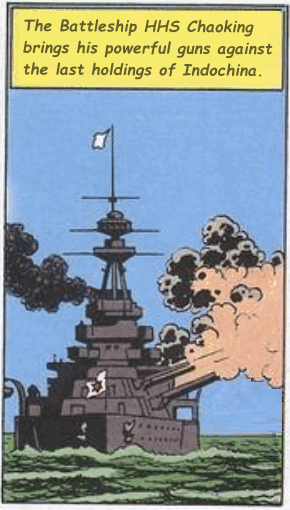
















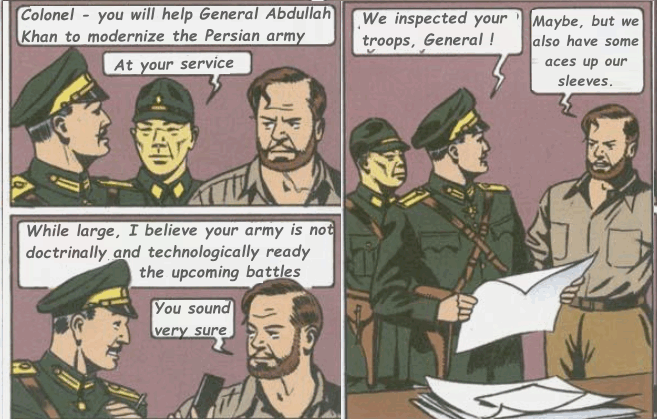























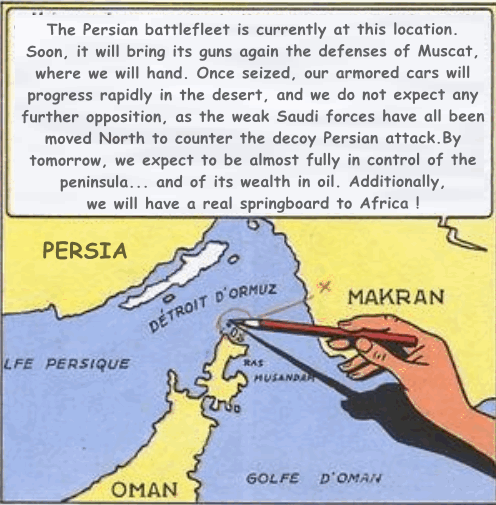











.png?width=1920&height=1080&fit=bounds)















